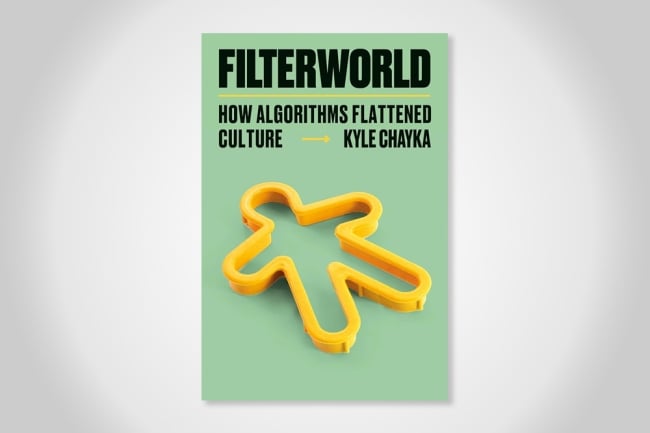You have /5 articles left.
Sign up for a free account or log in.

Penguin Random House
Filterworld: How Algorithms Flattened Culture
by Kyle Chayka
Published in January, 2024.
Filterworld is eye-opening. Before reading the book, I had not given too much thought or worry about algorithms replacing humans in shaping culture.
This algorithmic blind spot is likely a function of my limited involvement with social media. I’m not on Facebook, don’t get my music from Spotify, am still a bit hazy about Instagram, and only use Twitter to post links to my blog posts.
While I wish I could claim some moral high ground for mostly avoiding social media, the true reason is that I know too little about most things to spare the time. Every minute spent on Twitter or Facebook seems like a minute lost to reading (or listening) to a book.
Now that I’ve read (well, listened to) Filterworld, I understand how algorithms are eating culture.
The big argument that Chayka, a staff writer for The New Yorker, is making in Filterworld is that algorithmic selection of digital content for consumption tends to limit creative diversity and encourage groupthink. Some examples are well-known. Facebook plays a role in polarizing political opinion by promoting posts that track most closely to a user’s prior preferences.
The Facebook algorithm prioritizes only engagement, hence more advertising revenue, over any other goal. (Such as promoting democracy, public health, well-being or evidence).
Other examples in Filterworld of the cultural cost of algorithms replacing human editors (or curators) in selecting content include music and video streaming. The DJ on Spotify is an algorithm, with the system selecting songs not to broaden taste or challenge the listener but to ensure more time listening.
The shows and movies given prominence on Netflix are individually tuned to drive viewing based on prior watching. Netflix has the data to know what content to create and buy based on anticipated user engagement, as opposed to other goals such as challenging existing artistic and cultural norms.
Filterworld is a smart take on the impact of algorithms on cultural production and consumption. While I wish Filterworld had taken more seriously how power, authority and prejudice determined what was created and consumed in the pre-algorithmic age, the book succeeded in changing how I think about today’s digital platforms.
Filterworld was written before the birth of ChatGPT and our subsequent collective freakout about generative AI. If Chayka is worried about the impact of algorithmic selection of human-created content, imagine the concern when the songs, stories, and (eventually) shows are AI-generated.
It is not difficult to imagine scenarios explaining why universities (and the academics paid by universities) should be concerned about algorithmic content selection and AI-generated content.
What happens when scaled online learning platforms (Coursera, edX, etc.) leverage the brands of elite universities to the point where their brand equity is shiny enough to sell content and credentials without us pesky academic partners?
It is unclear why a learner would prefer a certificate of mastery from a university over a company. Corporations will be far less concerned than universities if the course content created for the online certificate programs (including professors lecturing) is AI-generated.
Where are algorithms replacing educators in higher ed? If this shift is indeed happening, how worried should we be?
What are you reading?




